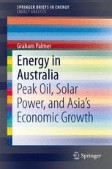Search
Search Results
-
Lived Experience and Scientific Knowledge of Climate Change
Classically, scientific approaches to knowledge, and specifically that of climate change, proceed through systematic collection and investigation of...
-
Integrating Policy Instruments into Energy System Models—From Theory to Application to Germany
This chapter provides an overview of the use of bottom-up energy system models to evaluate the long-term effects of energy and climate policy...
-
Cost-availability curves for hierarchical implementation of residential energy-efficiency measures
Historical residential electricity data and natural gas consumption data were collected for, respectively, 1,200 and 178 residences in a small town...

-
Policy Instruments to Foster Energy Efficiency
In this chapter we start by enumerating the reasons why progress in realizing the energy efficiency potential has been so limited both for firms and...
-
Reading the Signs of Sustainability in Christian Higher Education: Symbolic Value Claims or Substantive Organizational Change?
In this chapter, I examine campus sustainability and climate activism in U.S. religious higher education. I use social movement perspectives from...
-
Measuring Performance of Long-Term Power Generating Portfolios
We propose a model for assessing the performance of generation mixes in a mean-variance context. In particular, we focus on the expected price of...
-
Conclusions and Recommendations
The German turnaround of its energy supply system aims to simultaneously accomplish two goals: to phase out nuclear energy and to replace it by...
-
Ethics and Environmental Policy
This chapter offers a survey of important factors for the consideration of the moral obligations involved in confronting the challenges of climate...
-
Realigning Finance to Its Original Purpose
Financial considerations always win in society—almost. Yet, finance does at its core only two simple things:(1) It can act as an economic time...
-
Four Business Models for a Fast Commercialization of Plug-in Cars
Plug-in vehicles are one important means to lower CO2 emissions from the transport sector. Despite this, uptake is slow. This can be well explained...
-
The diffusion of voluntary green building certification: a spatial approach
Improvements in overall sustainability include reductions in energy consumption. There remain significant yet largely unexploited opportunities to...

-
Indirect Land Use Change Debate: What Did We Learn?
In recent years, many public policies and regulations have supported the biofuel expansion in many countries. One of the main reasons for this...
-
Optimal Investment Strategy for Competing Learning Technologies: An Analytical Approach
A major drawback of employing experience curves to model future technological change is the sensitivity of results to the rate of change, which in...
-
Driving Down Emissions: The Role of Carbon Pricing
Much of the discussion of climate change rests on the assumption that excess carbon dioxide emissions are a consequence of a market failure. Since...
-
Oil Reserves and Peak Oil
The history of estimating oil reserves has proven a history of long-lasting misunderstandings. The split between the environmental perception of...
-
Operation and Maintenance Contracts for Wind Turbines
Owners of wind parks often outsource operation and maintenance (O&M) of their assets. This chapter addresses the fundamental negotiating issues of...
-
Optimal Future Deployment of Renewable Power Technologies: A System Model Approach
In this chapter the large-scale power sector model CORE is presented, which is required to address the research question raised in chapter 2. The...
-
The savings of energy saving: interactions between energy supply and demand-side options—quantification for Portugal
Reducing demand by increasing end-use energy efficiency on the demand side of energy systems may also have advantages in reducing fossil dependency...

-
Evaluating the risks of alternative energy policies: a case study of industrial energy efficiency
Numerous studies have shown the potential for US manufacturing to cut its energy costs by installing more efficient equipment that offers competitive...

-
The German Gas Market
In 1959, the Groningen gas field in the Netherlands was discovered, the largest gas field in Europe and the tenth largest in the world. Up until...
